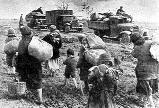At that time, the battalion received an order from the Baltic military district staff in Riga to send a detachment with an officer to protect a civilian broadcasting radio station in the town of Kuldiga, near Riga.
Ruvim was selected for that mission.
He and 8 soldiers loaded a truck GAZ-AA (replica of Ford – AA truck, circa 1931)
and arrived to Kuldiga.
He stayed there for 3 days.
However, German forces were quickly approaching and R. Katz received a new order: to disassemble the radio station, load a basic unit of it in the truck, and bring it to Riga.
Later on, it became clear that exporting the radio station turned out to be a useless action.
The disassembling of the radio station was led by a chief engineer of Latvian descent,
who hated Soviet aggressors.
He was openly telling Ruvim that “the Germans would not bring them any harm.”
|

Truck GAZ-AA ( Russian replica of Ford-AA truck )

Truck GAZ-AA drives through the crowds of war refugees, 1941
|
With this in mind, he directed them to load a unit that was not affecting the work of the radio station.
As soon as German troops entered Kuldiga, which happened on July 2nd, this radio station began to broadcast orders of German Army and appeals to the general Latvian
population to join a fight against retreating Red Army.
This all became clear much later, but at that moment, the order was cleared and on June 25, Ruvim’s truck started its way back to Riga (85 miles to the east, 3
hour drive) |